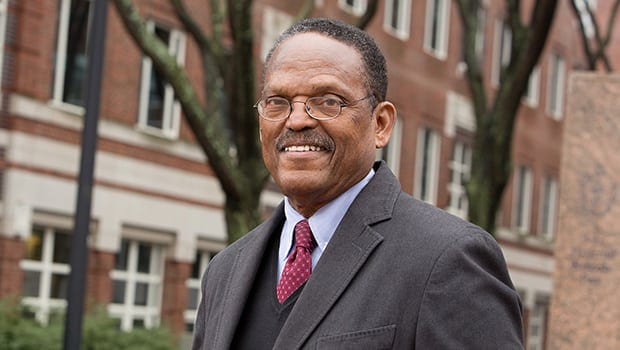
Civil rights and social policy expert William Julius Wilson does not pull punches when it comes to discussing the problems that face communities of color in today’s world — and at Boston University’s recent event examining The Civil Rights Act of 1964 he argued compellingly that the lack of access to jobs and job training means little hope for America’s most disadvantaged.
“It is not only increasing the minimum wage, it is providing jobs for these people, particularly young people in inner city neighborhoods, who can’t find employment,” Wilson said. “It is important to realize that a neighborhood in which people are poor and jobless is significantly different than a neighborhood in which people are poor and working.”
Wilson was a keynote speaker at Boston University’s “The Civil Rights Act of 1964 at 50: Past, Present & Future,” which marked the 50th anniversary of the historic legislation. Held at BU on Nov. 14 and 15, the two-day conference of panels and speakers addressed questions about the past, present and future impact of the Civil Rights Act.
The speakers examined many aspects of the landmark act, including its impact on social movements, activism and law reform, as well as its role as a template for additional civil rights laws.
A major theme throughout the conference was the tie between early civil rights legislation and current challenges in addressing inequality and discrimination, specifically in the areas of education, employment, housing and public services.
In addition to Wilson’s keynote talk, Chai Feldbum of the U.S. Equal Employment Opportunity Commission also spoke about gender equity and the evolution of equal rights for the sexes stemming from the Civil Rights Act of 1964, particularly in the area of sex discrimination in the workplace.
Wilson, a Harvard University professor and author of influential books that examine poverty and inner city issues, including “The Declining Significance of Race,” “The Truly Disadvantaged” and “When Work Disappears: The World of the New Urban Poor,” spoke about how, despite civil rights gains, the basic structure of the modern economy has continued to cause problems for poor communities of color. Lack of education and training are what keep workers of color from higher-paying jobs more so than discrimination. He pushed a view of civil rights beyond race relations toward economic relations.
Wilson traced the problem back to the 1960s opinion that the high levels of unemployment in the inner city and other low income areas — and specifically black poverty — was a problem unrelated to the national economy.
The thinking was that black poverty was a problem of discrimination and not because of America’s economic system. The result was to try and tackle it with anti-poverty measures and anti-discrimination laws — a move that Wilson says has been hurting disadvantaged communities ever since.
“Changes in the structure of employment since 1960s have seriously diminished the earnings and job stability of many workers, of many working Americans, whose skills have not kept pace with the shifting requirements of the labor market,” Wilson said. “The Great Recession, which officially lasted from December 2007 through June 2009, magnified this problem.”
As companies scramble to emerge from the recession, they have changed the way they do business, hire and retain employees. They deal differently with unions, which has meant fewer traditional, lower-wage jobs and no stability for middle-class workers hoping to earn good pay, benefits and steady promotions.
“Workers from all racial and ethnic backgrounds, who hold jobs in the most vulnerable occupational sectors, have been affected. They face working reduced hours, taking a lower-pay position or leaving the workforce permanently,” Wilson said. “And this is particularly true for black and Latino workers, especially from disadvantaged backgrounds.”
For many economists the mood is high with the Great Recession in the rearview mirror, but for the aforementioned black and Latino workers the problem is getting worse, not better.
There is just no way for them to compete in today’s job market, Wilson stressed.
Fixing the problem is possible, but Wilson says you can’t start if you don’t look in the right place.
For Wilson, the right place to start is to eliminate the restrictions that keep workers from advancing from the bottom in the changing structure of the U.S. economy.
He advocates for policies that support job training and any program that can help increase the skills of lower-wage workers, as well as social policies that help young adults to make a successful transition from school to work.
Wilson says he doesn’t think change will happen overnight, but he believes that an increased discussion of economic policies in the bigger race relations picture is crucial to change in the future.






